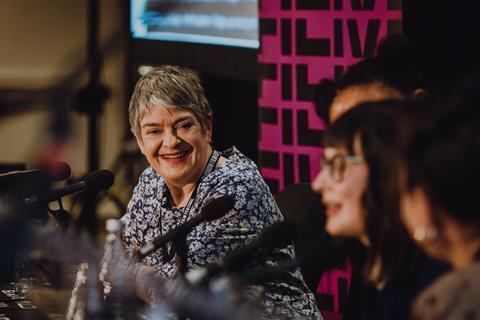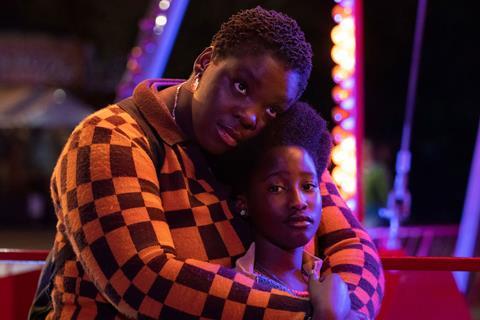
“We’re putting our money where our mouth is,” says Allison Gardner, Glasgow Film Festival (GFF) co-director, as she fizzes with excitement about the line-up of films at this year’s festival – which opens with Adura Onashile’s Glasgow-shot Girl and closes with Nida Manzoor’s Sundance title Polite Society. Both are feature debuts and UK premieres.
“Our opening gala and closing gala are both directed by young women. We’re giving premiere slots to emerging talent. We’re setting out our stall,” she adds.
The festival starts today (March 1) and runs until March 12. The line-up features six world premieres, 16 European and international premieres and 70 UK premieres. “I really like Butcher’s Crossing, the Nicolas Cage film,” says Gardner. “The End Of Sex is great as well – film festivals tend not to have a lot of funnies in them, so it’s good to have some comedy. Rye Lane is like a modern When Harry Met Sally.”
Off the back of its buzzy world premiere at the Berlinale, Canadian filmmaker and actor Matt Johnson will be in town with the UK premiere of Blackberry, and will also revisit The Dirties in its 10th anniversary year. Johnson is also the executive producer on Therapy Dogs, which has its international premiere at GFF.
This year’s country in focus is Spain. “Rodrigo Sorogoyen’s The Beasts is absolutely phenomenal, and Pedro Almodovar says Alauda Ruiz de Azúa’s Lullaby is the greatest debut he’s ever seen,” says Gardner.
“There are going to be more casualties”
Gardner is acutely aware of the challenges facing the festival and Glasgow Film Theatre (GFT), GFF’s home, of which Gardner is chief executive, with myriad financial pressures impacting the entire industry.
It is the first edition of GFF since the demise of fellow Scottish festival, the Edinburgh International Film Festival (EIFF) and its home cinema the Edinburgh Filmhouse (parent company the Centre for Moving Image went into administration in October of last year). It’s the first fully in-person edition, after 2021’s online and 2022’s hybrid editions. It’s also the last edition of the festival with Gardner’s co-director, Allan Hunter, who is stepping down after being in the role alongside Gardner since 2007.
A direct replacement for Hunter is looking unlikely. “I’m going to rethink and take a little bit of time. What the festival needs is more interesting young programmers. When Allan and I started in 2007, we weren’t sure how GFF was going to go. A lot of it was establishing and building bricks.
“I haven’t quite got the structure in my mind correct yet. Once this festival is over I need to be sitting in a dark room giving myself some headspace. It might be a different model, that might be freelancers or somebody who coordinates it all. Let’s be honest – a lot of it is based on budget. We haven’t had an increase in our core funding from Creative Scotland since 2015. It’s now 2023, so it’s effectively a cut. That’s the same as all regular funded organisations in Scotland, that’s not unique to us. There are funding challenges for all arts organisations.”
Gardner’s approach is to slightly shrink the overall size of the festival compared to 2020, but to get more people into every screening and maintain affordable ticket costs. “We haven’t increased our prices at GFT or GFF since 2019. We understand people are under constrictions and do not have as much cash and we look at ways to offer free screenings.”
She’s also keen to encourage more cross-festival collaboration to help resources go further, and is a supporter of the Rotterdam International Film Festival’s call last month for the creation of a formal cross-festival coalition.

“I have always thought we should be working together so we give bigger bang for our public money. We had been having those conversations with [EIFF creative director] Kristy [Matheson], two weeks before it [CMI demise] was announced.
“We do it with Dublin film festival – we share [international] guests and the cost of that. Sometimes American guests like getting the whole Celtic experience. We share intel – I tell [Dublin artistic director] Grainne [Humphreys] stuff. She’s got her finger on Irish cinema so she sends me stuff as well.
’I talk to [programmer] Ania [Trzebiatowska] at Sundance. There have been loose collaborations for many festivals, but a more structured collaboration, like we were hopefully going to do with Edinburgh, is making sure you’re getting good value for public money and using it wisely.”
It’s a tricky time for the UK festival landscape, with EIFF’s future still uncertain, the BFI London Film Festival (LFF) yet to name a new director and both LFF and Sheffield DocFest needing to iron out new funding models. Is Gardner feeling the heat?
“We are quite resilient here at Glasgow,” confirms Gardner. “I do think there are going to be more casualties, in terms of cinemas closing and models changing. Because we’ve never been huge, we’re quite adaptable. That adaptability and resilience is key to our success.”
Post-Brexit industry focus
GFF’s industry programme runs from March 6-9 and hones in on female talent, with speakers including Birds’ Eye View director Melanie Iredale, British Council’s Catherine Bray, Seahorse filmmaker Jeanie Finlay, Censor producer Helen Jones, Film London’s Jordan McGarry and a panel on women working in animation headlined by Lauren Castro, manager of adult animation comedy at Netflix, Helen Argo, Bafta-nominated producer of Aardman and filmmaker Isabel Barford.
There’s also the launch of new industry strand ‘Scotland and Europe’ that spotlights collaborations with Europe post-Brexit, with representatives from Locarno film festival attending. “Locarno is a great festival, I love working with them. It’s a nice European connection, since taking our toys out of the pram [with Brexit].”
Gardner is keen to continue harnessing the key ingredient that drives a lot of the industry to GFF. “We’ve got the reputation of being the friendliest film festival,” she beams.
“We’re all out there, the whole festival team, and we’re always approachable. That’s what makes us a fun place to come. Let’s face it, we’re in the entertainment business. We’re there to have a good time.”















![[L-R]: Amanda Villavieja, Laia Casanovas, Yasmina Praderas](https://d1nslcd7m2225b.cloudfront.net/Pictures/274x183/6/4/1/1471641_pxl_20251224_103354743_618426_crop.jpg)








![[L-R]: Amanda Villavieja, Laia Casanovas, Yasmina Praderas](https://d1nslcd7m2225b.cloudfront.net/Pictures/100x67/6/4/1/1471641_pxl_20251224_103354743_618426_crop.jpg)
No comments yet